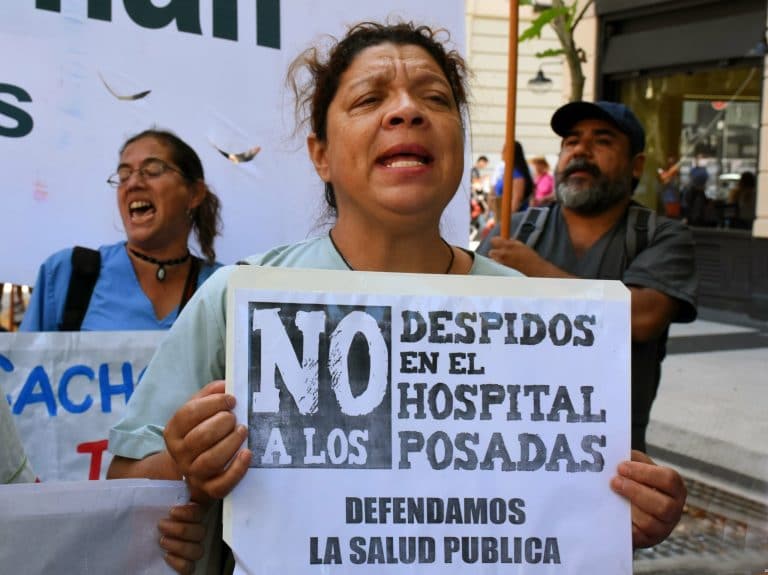Alberto Fernandez and Political Realism in Argentina


Orinoco Tribune – News and opinion pieces about Venezuela and beyond
From Venezuela and made by Venezuelan Chavistas

By Atilio A. Boron on December 9, 2019
Argentina is beginning a long and hard period of recovery after its economy was destroyed; society disintegrated; culture degraded; and the country was shamefully subjugated to the White House’s orders on behalf of the Mauricio Macri Administration. It is unnecessary to list the huge damage caused by the neoliberal tsunami that struck this country since the rightist leader took office.
Anyone living in this country knows it and endures it; those abroad do too. Starting on December 10, 2015 we’ve seen, day by day, that a neoliberal agenda was being used once again despite it had already been tried twice before with the same disastrous results. The first one, under the civic-military dictatorship (1976-1983) and inspired by Economy Minister Jose Alfredo Martinez de Hoz; the second one, during the long Carlos Menem’s decade (1989-1999) with the ideological leadership of Domingo Felipe Cavallo. The influence of this second trial started in 1989, when Carlos Menem left aside his populist whims and shamelessly embraced neoliberalism. It extended through the brief government that came after him –the Alliance, where Cavallo’s terrible influence made that new experiment end up in an unprecedented economic collapse. The night came back following the positive labor carried out by the Kirchner administrations (2003-2007; 2007-2015), in which the economy recovered; deep wounds caused by an absent state on the social life started to heal; culture was revalued; education and the country’s scientific labor took its rightful place with realism in the great emancipating trend that ended up rejecting the Free Trade Area of the Americas (FTAA) and ushered in a new independent entrance to the international scene. Out of our own mistakes rather than virtues of this rightist sector and its U.S. mentors, funders and advisors, the right unexpectedly found a new opportunity.
RELATED CONTENT: Sebastián Moro, Argentine Journalist Killed in Bolivia
And they didn’t waste much time. Different to what progressive and leftist governments used to do, which with some exceptions advanced control by an inexplicable feeling of guilt due to accusations and slanders from the right, the latter moved at a devastating pace and with no sort of republican or democratic scruples. The strongest executive’s decision-making process was immediately put in practice. In a few days, the persecution started against journalists, former ministers and high-ranking officials of the Kirchner administrations; the informational terrorism carried out for long years by media oligarchies was strengthened; the Federal Justice was subjugated to the orders of the President in turn and “pre-trial detentions” and lawfare was actively deployed. The new Macri administration was so bold as to try to appoint by decree two new members of the Supreme Court of Justice just five days after beginning its term; all the flags of an independent foreign policy were lowered and a stupid pride was assumed by following Washington’s dictates and a neocolonial stance. The main CEO from large companies were appointed for the new government’s economic management, leaving aside any consideration regarding conflict of interests, such as the case in which a manager of a large company is appointed in a high-ranking post within the State to set the regulations for…yes, their own company! Details of this obvious conflict of interest were systematically underestimated, or rather ignored, by the mainstream media, whose responsibility in Argentina’s tragedy should be carefully analyzed and, if it’s the case, be faced with lawsuits.
Fortunately, this stage is coming to an end. The legacy of this third neoliberal experiment –whose purpose has never been about economic development and even less about social inclusion–, is overwhelming but not insurmountable. What they did was to organize the country’s wealth by looting; guarantee steep revenues for companies controlled by friends of the regime in several production and service fields; fostering the concentration of capital and eliminating small and medium-sized enterprises; enabling capital flight and financial speculation through exchange rates and extravagant interest rates; increase the assets among the richest; and impoverish most of the population.
RELATED CONTENT: Stella Calloni: “We are Under a Counterinsurgency War” (Interview)
The evolution of poverty figures irrefutably evidences this project’s oligarchic nature. But, in honor of the Argentinean people, such looting could not be completely achieved. People kept in permanent resistance. Large general strikes; actions by major unions, among them the tenacious struggle of the Buenos Aires provincial teachers, workers’ continual mobilizations against adjustments, and social movements’ healthy decision to not leave the streets –irreplaceable scenario to confront these type of projects– were decisive to thwart essential initiatives such as the pension and labor reforms and prevent a Supreme Court ruling that benefited people responsible for genocide, which had been fostered by the judges proposed by the government. The terrific Women’s campaign for a legal, safe and free abortion was another sign sent to the government, clearly evidencing a climate of public opinion frankly contrary to its policies. The response of the Presidential Office was to stiffen repression and fine-tune its propaganda mechanisms with “political neuromarketing” to spread hatred and fear among those who tried to oppose its terrible designs.
A whole new paragraph is deserved for the government’s huge indebtedness without a proportional compensation translated into public works –such as schools, hospitals, public transportation, roads, infrastructure, etc– or social policies, organizing a detailed international audit to pay off the real debt and claim a devolution of money to those who used the public debt to increase their assets just for being close to the political power. This situation brings back another chapter in Argentina’s history that deserved the strong and ironic reaction of statesman Domingo F. Sarmiento, who referred to the issue by the end of the first term in office of Julio A. Roca, in 1885, with the following words: “Silence Sparta’s virtues, silence Rome’s deeds. Silence that the world is watching the South’s greatest debtor!” A pathetically up-to-date reference 134 years later. And worse because neither Roca nor his successor Miguel Juarez Celman were so irresponsible as to incur on a 100-year debt, as the Mauricio Macri Administration did.
Hard years are to come but they are also full of hope. Argentina is going to start walking another path. Neoliberalism’s general sinking is irreversible. Its Latin American flagship –Chile from the old and new dictator Pinochet’s followers– is going down in the Pacific Ocean and no one is going to be able to set it afloat again. Peru, Ecuador, Haiti, Honduras, and Colombia –Yes, Colombia, which had endured a very limited general strike back in 1977 and has faced three huge strikes against Ivan Duque’s neoliberal package during the last week– are following “the Chilean way” of pushing the procession towards neoliberalism’s definitive burial. In France, Emmanuel Macron can’t stop the wave of violent protests shocking the country for over a year now and that have been spreading through Europe. In the United States, Donald Trump (the “U.S. Gorbachev”) is working very efficiently to end the neoliberal international order built by the White House for its own benefit since the end of World War II.
This is, in a few lines, the global context in which Alberto Fernandez takes office in Argentina. He has already given encouraging signs of the path his government is going to take. The mood in the society has noticeably changed even today. The vast majority of the population is going to accompany him in his attempt but he has to be careful not to fall into bureaucratic or legal delays, which frequently halt the governments’ best projects. Time is against him but there are many elements favoring him so as to move towards building the nation again. People are full of hope and that is a great political capital when you begin your path. If he acts rapidly, the support of the large majorities is going to increase rapidly, giving him more power to face successfully the threats and obstacles in his path.
We end these lines recalling the advice given by Max Weber in his famous conference “Politics as a Vocation” (1919), regarding moments like these in which history takes a sudden turn, stating that “a man would not have attained the possible unless time and again he had reached out for the impossible.” Being realist will demand reaching out for the impossible and being persistent “time and again.” For Argentina’s sake, we hope Weber’s timely advice is heard.
Featured image: “People kept in permanent resistance during Macri”. Photo: Bill Hackwell
Source URL: Resumen Latinoamericano – English

Atilio A. Borón is a Harvard Graduate professor of political theory at the University of Buenos Aires and was executive secretary of the Latin American Council of Social Sciences (CLACSO). He has published widely in several languages a variety of books and articles on political theory and philosophy, social theory, and comparative studies on the capitalist development in the periphery. He is an international analyst, writer and journalist and profoundly Latinoamerican.